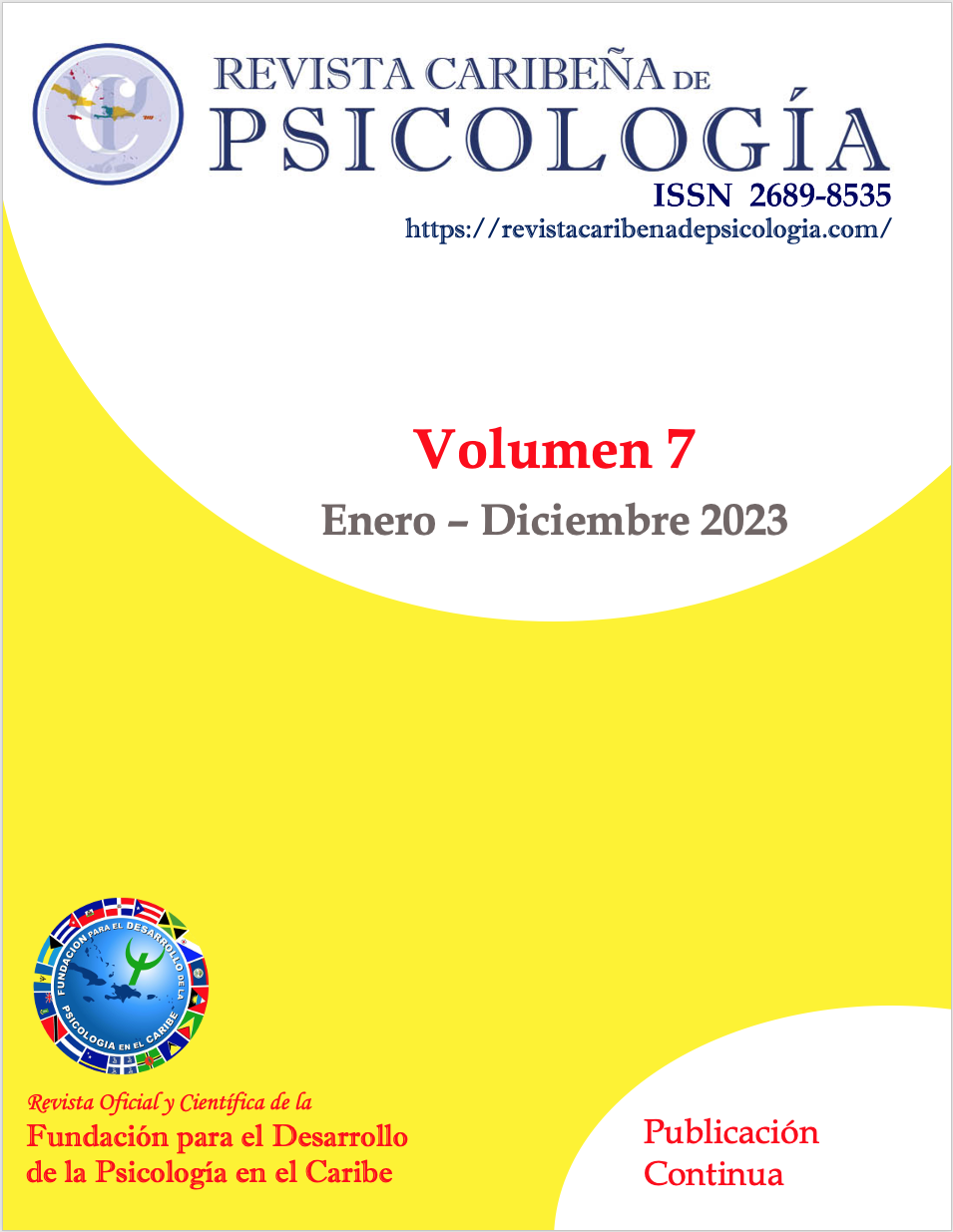Uso de Alcohol o Sustancias Durante la Cuarentena: Sintomatología Psicopatológica y Estrategias de Afrontamiento
DOI:
https://doi.org/10.37226/rcp.v7i1.7457Palabras clave:
afrontamiento, cuarentena, psicopatología, sustanciasResumen
Los objetivos de este estudio exploratorio de enfoque mixto fueron: (a) conocer si hay diferencia significativa en las estrategias de afrontamiento y sintomatología psicopatológica entre un grupo de personas que utilizó sustancias como estrategia de manejo ante la cuarentena por COVID-19 (n = 32) y uno con poco/ningún consumo de alcohol o sustancias (n = 32) y (b) explorar las experiencias de las personas con uso de sustancia en cuarentena. Los primeros dos objetivos se analizaron mediante pruebas t. Los resultados sugieren que las personas que utilizaron sustancias reportaron el uso de religión significativamente menos y el uso del humor significativamente más. Además, las personas que utilizaron sustancia mostraron significativamente más sintomatología de obsesiones/compulsiones, depresión, ansiedad, ideación paranoide y psicoticismo. Se realizó un análisis temático en NVivo-12 sobre las experiencias en el cual se identificaron seis temas principales: experiencia durante la cuarentena, estrategias de manejo, razones para consumir sustancias, cambios en consumo, impacto en la salud y calidad de vida y experiencias con servicios de salud mental y dispensarios de cannabis medicinal. Este estudio contribuye a que se desarrollen iniciativas interdisciplinarias que identifiquen y fomenten el uso de estrategias adaptativas de manejo de emociones y situaciones estresantes.
Citas
Alvarado-Díaz, E., & Pagán-Torres, O. M. (2021). Consideraciones sobre la espiritualidad y la religión como recursos de afron-tamiento durante la pandemia del COVID-19. Revista Caribe-ña de Psicología, 5, e5007. https://doi.org/10.37226/rcp.v5i1.5007
Babson, K. A., Sottile, J., & Morabito, D. (2017). Cannabis, canna-binoids, and sleep: A review of the literature. Current Psychia-try Reports, 19(4). https://doi.org/10.1007/s11920-017-0775-9
Baker, J. P. & Berenbaum, H. (2007). Emotional approach and problem-focused coping: A comparison of potentially adapti-ve strategies. Cognition and Emotion, 21(1), 95-118. https://doi.org/10.1080/02699930600562276
Borger, E., Bramness, J.G., Skurtveit, S. & Bukten, A. (2016). Subs-tance use and sociodemographic background as risk factors for lifetime psychotic experiences in a non-clinical sample. Journal of Substance Abuse Treatment, 74, 42-47. http://dx.doi.org/10.1016/j.jsat.2016.12.007
Braun, Virginia & Clarke, V. (2006). Using thematic analysis in psychology. Qualitative Research in Psychology, 3, 77-101. https://doi.org/10.1191/1478088706qp063oa
Braun, V., & Clarke, V. (2021). One size fits all? What counts as quality practice in (reflexive) thematic analysis? Qualitative Research in Psychology, 18(3), 328-352. https://doi.org/10.1080/14780887.2020.1769238
Brunette, M.F., Mueser, K.T., Babbin, S., Meyer-Kalos, P., Rosen-heck, R., Corell, C.U., Cather, C., Robinson, D.G., Schooler, N.R., Penn, D.L., Addington, J., Estroff, S.E., Gottlieb, J., Glynn, S.M., Marcy, P., Robinson, J. & Kane, J.M. (2017). De-mographic and clinical correlates of substance use disorders in first episode psychosis. Schizophrenia Research, 194, 4-12. https://doi.org/10.1016/j.schres.2017.06.039
Carver, C. S., Scheier, M. F., & Weintraub, J. K. (1989). Assessing coping strategies: A theoretically based approach. Journal of Personality and Social Psychology, 56(2), 267–283. https://doi.org/10.1037/0022-3514.56.2.267
Carver, C.S. & Scheier, M.F. (1994). Situational coping and coping dispositions in a stressful transaction. Journal of Personality and Social Psychology, 66(1), 184-195. https://psycnet.apa.org/buy/1994-29622-001
Casullo, M.M., & Pérez, M. (2008). El Listado de Síntomas SCL-90-R de Derogatis. Buenos Aires: Departamento de Publicaciones. Facultad de Psicología. UBA.
Chodkiewicz, J., Talarowska, M., Miniszewska, J., Nawrocka, N., & Bilinski, P. (2020). Alcohol Consumption Reported during the COVID-19 Pandemic: The Initial Stage. International Jour-nal of Environmental Research and Public Health, 17(13), 4677. https://doi.org/10.3390/ijerph17134677
Chukwuemeka, N., Okafor, K.J., Bautista, M.A. & Ijeoma, O. (2022). Coping in the Time of COVID-19: Buffering Stressors With Coping Strategies. Journal of Loss and Trauma, 27(1), 83-91. https://doi.org/10.1080/15325024.2021.1914987
Cruz-Correa, M., Díaz-Toro, E., Falcón, J., García-Rivera, E., Guiot, H., Maldonado-Dávila, W., Martínez, K.G., Méndez-Latalladi, W., Pérez, C.M., Quiñones-Feliciano, M.L., Reyes, J.C., Rodríguez, P., Santana-Bagur, J., Torrellas, L.C., Váz-quez, D., Vázquez, G.J. & Rodríguez-Quilichini, S. (2020). Pu-blic Health Academic Alliance for COVID-19 Response: The Role of a National Medical Task Force in Puerto Rico. Interna-tional Journal of Environmental Research and Public Health, 17(13). https://doi.org/10.3390/ijerph17134839
Emery, R. L., Johnson, S. T., Simone, M., Loth, K. A., Berge, J. M., & Neumark-Sztainer, D. (2021). Understanding the impact of the COVID-19 pandemic on stress, mood, and substance use among young adults in the greater Minneapolis-St. Paul area: Findings from project EAT. Social science & medicine (1982), 276, 113826. https://doi.org/10.1016/j.socscimed.2021.113826
Fedorova, E. V., Wong, C. F., Conn, B. M., Ataiants, J., Iverson, E., & Lankenau, S. E. (2022). COVID-19's Impact on Substance Use and Well-Being of Younger Adult Cannabis Users in Cali-fornia: A Mixed Methods Inquiry. Journal of Drug Issues, 52(2), 207–224. https://doi.org/10.1177/00220426211052673
Guest, G., Bunce, A., & Johnson, L. (2006). How Many Interviews Are Enough? An Experiment with Data Saturation and Va-riability. Field Methods, 18(1), 59–82. https://doi.org/10.1177/1525822x05279903
Harris, R. (2006). Embracing your demons: an overview of Accep-tance and Commitment Therapy. Psychotherapy in Australia, 12(4), 2-8.
Hernzández-Sampieri. R., & Mendoza-Torres, P. (2018). Metodo-logía de la Investigación: Las rutas cuantitativa, Cualitativa y Mix-ta. McGraw-Hill Education.
Jackson, S. E., Garnett, C., Shahab, L., Oldham, M., & Brown, J. (2021). Association of the COVID-19 lockdown with smoking, drinking and attempts to quit in England: An analysis of 2019-20 data. Addiction, 116(5), 1233–1244. https://doi.org/10.1111/add.15295
Lazarus, R. S., & Folkman, S. (1984). Stress, Appraisal, and Coping. Springer.
Ledesma, R. (2008). Introducción al Bootstrap: Desarrollo de un ejemplo acompañado de software de aplicación. Tutorials in Quantitative Methods for Psychology, 4(2), 51-60. https://www.tqmp.org/RegularArticles/vol04-2/p051/p051.pdf
Lorenzo-Ruiz, A., Díaz, K., & Zaldívar, D. (2020). La psicología como ciencia y profesión en el afrontamiento del COVID-19. Revista Caribeña de Psicología, 4(2), 153-165. https://doi.org/10.37226/rcp.v4i2.4815
MacMillan, T., Corrigan, M. J., Coffey, K., Tronnier, C. D., Wang, D., & Krase, K. (2021). Exploring factors associated with al-cohol and/or substance use during the COVID-19 pandemic. International Journal of Mental Health and Addiction, 20, 1814-1823. https://doi.org/10.1007/s11469-020-00482-y
Marshall, B., Cardon, P., Poddar, A. & Fontenot, R. (2013). Does sample size matter qualitative research? The Journal of Compu-ter Information Systems, 54(1), 11–22. https://doi.org/10.1080/08874417.2013.11645667
Martínez-Cao, C., de la Fuente-Tomás, L., Menéndez-Miranda, I., Velasco, Á., Zurrón-Madera, P., García-Álvarez, L., Sáiz, P. A., García-Portilla, M. P. & Bobes, J. (2021). Factors associated with alcohol and tobacco consumption as a coping strategy to deal with the coronavirus disease (COVID-19) pandemic and lockdown in Spain. Addictive Behaviors, 121. https://doi.org/10.1016/j.addbeh.2021.107003
Martínez-Taboas, A. (2020). Pandemias, COVID-19 y Salud Men-tal: ¿Qué Sabemos Actualmente? Revista Caribeña de Psicología, 4(2), 143-152. https://doi.org/10.37226/rcp.v4i2.4907
Martinotti, G., De Risio, L., Vannini, C., Schifano, F., Pettorruso, M. & Di Giannantonio, M. (2020). Substance Related Exo-genous Psychosis: A post-modern syndrome. CNS Spectrums, 26(1), 84-91. https://doi.org/10.1017/S1092852920001479
National Institute on Drug Abuse (NIDA). (2020). Glossary: Com-monly Used Terms in Addiction Science. https://wyoleg.gov/InterimCommittee/2020/10-20201105Handoutfor6JtMHSACraig11.4.20.pdf
Pearlin, L. I., & Schooler, C. (1978). The structure of coping. Jour-nal of Health and Social Behavior, 19 (1), 2–21. https://doi.org/10.2307/2136319
Perczek, R., Carver, C. S., Price, A. A., & Pozo-Kaderman, C. (2000). Coping, mood, and aspects of personality in Spanish translation and evidence of convergence with English ver-sions. Journal of Personality Assessment, 74(1), 63–87. https://doi.org/10.1207/S15327752JPA740105
Pérez-Pedrogo, C., Francia-Martínez, M., & Martínez-Taboas, A. (2020). COVID-19 in Puerto Rico: Preliminary observations on social distancing and societal response toward a novel health stressor. Psychological Trauma: Theory, Research, Practice, and Policy, 12(5), 515-517. https://doi.org/10.1037/tra0000664
Rosa-Alcázar, Á., García-Hernández, M. D., Parada-Navas, J. L., Olivares-Olivares, P. J., Martínez-Murillo, S., & Rosa-Alcázar, A. I. (2021). Coping strategies in obsessive-compulsive pa-tients during Covid-19 lockdown. International Journal of Clinical and Health Psychology, 21(2). https://doi.org/10.1016/j.ijchp.2021.100223
Rubinsky, A. D., Dawson, D. A., Williams, E. C., Kivlahan, D. R., & Bradley, K. A. (2013). AUDIT-C scores as a scaled marker of mean daily drinking, alcohol use disorder severity, and proba-bility of alcohol dependence in a U.S. general population sample of drinkers. Alcoholism: Clinical and Experimental Re-search, 37(8), 1380-1390. https://doi.org/10.1111/acer.1209
Rubinsky, A. D., Kivlahan, D. R., Volk, R. J., Maynard, C., & Brad-ley, K. A. (2010). Estimating risk of alcohol dependence using alcohol screening scores. Drug and Alcohol Dependence, 108, 29-36. https://doi.org/10.1016/j.drugalcdep.2009.11.009
Saarinen, A., Grano, N., Hintsanen, M., Lehtimäki, T., Cloninger, C.R. & Keltikangas-Järvinen, L. (2020). Bidirectional pathways between psychosocial risk factors and paranoid ideation in a general nonclinical population. Development and Psychopathology, 34(1), 1-10. https://doi.org/10.1017/S0954579420001030
Serowik, K. L., & Orsillo, S. M. (2019). The relationship between substance use, experiential avoidance, and personally meaningful experiences. Substance Use & Misuse, 54(11), 1834–1844. https://doi.org/10.1080/10826084.2019.1618329
Simon, J. L., & Bruce, P. (1991). Resampling: A Tool for Everyday Statistical Work. Chance 4, 22–32. https://doi.org/10.1080/09332480.1991.11882408
Stanisławski, K. (2019). The Coping Circumplex Model: An Inte-grative Model of the Structure of Coping With Stress. Frontier in Psychology, 10(694). https://doi.org/10.3389/fpsyg.2019.00694
Taylor, S., Paluszek, M. M., Rachor, G. S., McKay, D., & Asmund-son, G. J. G. (2021). Substance use and abuse, COVID-19-related distress, and disregard for social distancing: A network analysis. Addictive behaviors, 114, 106754. https://doi.org/10.1016/j.addbeh.2020.106754
Walker, D. D., Jaffe, A. E., Pierce, A. R., Walton, T. O., & Kaysen, D. L. (2020). Discussing substance use with clients during the COVID-19 pandemic: A motivational interviewing approach. Psychological Trauma: Theory, Research, Practice, and Policy, 12(S1), S115 –S117. https://doi.org/10.1037/tra0000764
Wrześniewski, K. (2000). Estilos y estrategias para el afrontamien-to del estrés. Problemas de medida. En: I. Heszen-Niejodek, Z. Ratajczak (ed.), El hombre en una situación estresante. Problemas teóricos y metodológicos (págs. 44–63). Katowice: Editorial de EE.UU.
Descargas
Publicado
Cómo citar
Número
Sección
Licencia
Derechos de autor 2023 Verónica López-Rodríguez, Alejandro Montalván-López, Andrea Díaz-García, George Scott, Axel Ramos-Lucca

Esta obra está bajo una licencia internacional Creative Commons Atribución 4.0.







